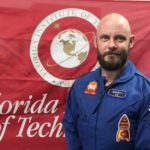 Dave Masaitis – Commander
Dave Masaitis – Commander
Dave was born in 1983 and spent most of his childhood growing up along the Outer Banks of North Carolina. He was an avid outdoorsman and naturalist, constantly looking out to sea, and upwards towards the sky. He attended Space Camp three times between 1995 and 1997, and that lasting impression would resurface later in life. He graduated from Oakton High School in Northern Virginia in 2001.
Dave served in the US Army from 2002 to 2013, carrying out duties over a decade in Air Defense, Army Aviation, and later the Cavalry. He served in support of NATO operations in Afghanistan on two occasions; first in 2007 as a UH-60 Maintenance Section Leader and Downed Aircraft Recovery Team (DART) Leader, and again in 2010-2011 as a Scout Section Leader. His military education includes the Airborne School, Sniper School, Primary Leadership Development Course, Advanced Leadership Course, Army Combatives Instructor Course, Javelin Missile Instructor Course, among others.
After leaving the Army in 2013, Dave spent a couple years as a certified gunsmith, before enrolling in Daytona State College in 2015, to study Marine Biology. While there he researched novel approaches to capturing dolphin vocalizations, before transferring to the Florida Institute of Technology in 2016. Upon arrival he declared a double-major in Astrobiology, and served as the Founding President of the Astrobiological Research and Education Society (ARES) until the Spring of 2018.
After stepping down from the board, he assumed leadership of the ARES Agricultural Robotics Team, where he presently remains. He is otherwise leading research in Recirculating Integrated Multi-Trophic Aquaculture (RIMTA) systems, intending to create a self-contained sustainable solution for food production on long-duration space exploration expeditions.
In February of 2019, Dave joined seven other young professionals as the Executive Officer of Crew 205 – The International Emerging Space Leaders crew.
Dave is a member of the Astrobiological Research and Education Society, Pi Lambda Phi Fraternity, the Planetary Society, The Mars Generation, the 82nd Airborne Division Association, the Army Sniper Association, and the Veterans of Foreign Wars.
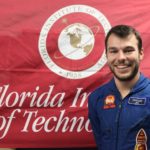 Nathan Hadland – Executive Officer
Nathan Hadland – Executive Officer
Nathan Hadland is a student at Florida Institute of Technology pursuing a Bachelor of Science degree in Astrobiology with a minor in Physics. Nathan is an MDRS verteran– in February of 2019, Nathan joined seven other young professionals as the GreenHab Officer of Crew 205 as part of the International Emerging Space Leaders crew. He began scientific research in his freshman year in a planetary science lab, conducting atmospheric simulations of Neptune’s Great Dark Spot. Since then, he has been a co-author on several different conference abstracts and will be the first author on an upcoming publication. The following semester, he added Research to Advance the Development of Interstellar Horticulture (RADISH) to his research portfolio, which investigates sustainable, in situ, food productions systems by growing plants in Martian regolith simulant. The research also involves developing agricultural robotics to cut astronaut crew time spent on food production, a project that is done in conjunction with the Kennedy Space Center. The publicity for this research largely comes from the Astrobiological Research and Education Society’s charter chapter at Florida Tech, which Nathan serves as president of. Additionally, Nathan spent the summer of 2017 at the University of Tennessee for an NSF REU program in microbial ecology, which focused on the growth kinetics of heterotrophic bacteria over long periods while in co-culture with the toxic cyanobacteria, Microcystis. In the summer of 2018, Nathan worked at the Johnson Space Center with the Astromaterials Research and Exploration Science laboratory and the Lunar and Planetary Institute (LPI) where he used experimental petrology to constrain fluid:rock chemistry on Mars through acidic, hydrothermal dissolution of phosphate-rich and phosphate-poor basalts with implications for the Stimson Formation in Gale Crater. In the summer of 2019, Nathan worked at NOAA’s Earth Systems Laboratory in Boulder, Colorado where he worked on unmanned aerial systems in the Arctic through the NOAA Hollings program which provides tuition assistance and an internship.In the near future, Nathan hopes to go to graduate school to pursue his PhD with the hopes of working in research at NASA, a non-profit, or another governmental agency in the realm of planetary science and an ultimate goal of becoming an astronaut.
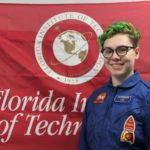 Hannah Blackburn – Lead Science Officer
Hannah Blackburn – Lead Science Officer
Hannah Blackburn was raised in the Research Triangle region of North Carolina. Hannah studies astrobiology at the Florida Institute of Technology, the first and only American university to offer an astrobiology undergraduate degree program. Hannah’s research is focused on in situ resource utilization (ISRU), the use of local materials by spacecraft and for human space exploration. Martian regolith is one such resource, and its potential as a growth substrate for agricultural use is being explored by the Research to Advance Interstellar Horticulture (RADISH) project at the Aldrin Space Institute. Hannah also studies the effects of microgravity on plant-microorganism interactions such as genetic transformation of the model plant Arabidopsis thaliana through the plant-pathogenic bacteria Agrobacterium tumefaciens. Hannah has prior experience at the Mars Desert Research Station from the International Emerging Space Leaders Crew 205. Through the Florida Institute of Technology chapter of the Astrobiological Research and Education Society (ARES), Hannah engages in public science outreach. As a member of Florida Tech’s Student Astronomical Society, Students for the Exploration and Development of Space, and Society of Physics Students, Hannah mentors underclassmen. Hannah is proud to represent LGBTQ+ scientists by flying a rainbow flag at the Mars Desert Research Station.
Hannah and other F.I.T. students assist with the Mars Society’s Marspedia Online Encyclopedia project and is helping to build an archive of past crew reports.
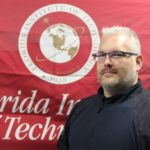 Keith Crisman – Health and Safety Officer
Keith Crisman – Health and Safety Officer
Keith Crisman is a PhD Candidate in the Florida Institute of Technology’s (FIT) Human Centered Design program with an emphasis on rescue and safety systems in human spaceflight. He is currently supporting FITs Human Spaceflight Laboratory as the Safety Officer and Research Assistant. Keith performed thorough risk analysis and developed Adaptive Spaceship Cockpit Simulator and Intravehicular Spacesuit operational procedures supporting successful IRB application for Humans-in- the-Loop Simulations. Further, he has collaborated on FAA Commercial Space Transportation research related to analytics of the normative Human Spaceflight environment as well as collaborations with Embry Riddle University during research on IVA Spacesuit Ergonomics for Spacesuit Cabin Integration Human Factors. He has an immense educational background starting with automotive technology certification from Pike-Lincoln Technical Center, an AAT from Ozarks Technical Community College, a BS in psychology/biology from the University of North Dakota, and Human Factors of Aeronautics with an MS from the Florida Institute of Technology. His dissertation focuses on emergency medical systems for human spaceflight with microgravity and scenario driven design. Current titles include NASA Student Ambassador, NASA Aerospace Scholar, as well as Safety Officer and Research Assistant for HCD’s Human Spaceflight Lab. His certifications include DAN DFA-PRO provider, PADI Rescue Diver, and AAUS Scientific Diver along with various related certifications. His work throughout this path has resulted in a Contained Environment Airlock Pass-Through (CEB) and Geologic Sample Return Container (SMR) for a Pressurized, Manned Rover, Collaboration between NASA Marshall Space Flight Center and the University of North Dakota Space Studies Department, completed in 2012 and a patent for a Ferrohydrodynamic Thermal Management System and Method, US20160116223 A1, Fourier Electric LLC, Orlando, FL, USA, patent filed 2014. Keith’s current design is an emergency containment system for single person use in a microgravity environment. Along with all of this, Keith is slowly instilling his love for space, the cold, and hockey with his 5-year-old daughter. His primary goal is to become an Astronaut for NASA. Semper Exploro.
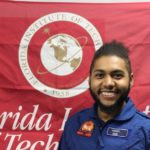 Alejandro Perez — Engineer
Alejandro Perez — Engineer
Born in 1997 near the heart of Connecticut, Alejandro was encouraged as a child to explore and learn the places around him. From an early age he was obsessed with learning about the way life worked not only in the nature around him, but the machines and systems that were commonly used.
Before leaving high school Alejandro was involved with a multitude of science and engineering camps ranging from basic circuitry for electric cars to constructing large structures like catapults. He also participated in tissue engineering research at the University of Connecticut shortly before graduation. While he was in high school Alejandro was a large advocate for education and learning for all. Here he found his love for science in biology and engineering.
After high school, Alejandro would be accepted at the Florida Institute of Technology to study Biomedical Engineering. The goal being to design space suits for future deep space exploration. During this time he was selected to be the Risk Manager of Delta Tau Delta Fraternity. Simultaneously being the project lead for many studies involving the human bodies response to stress. Once the taste of research was had Alejandro would later be invited to join the Astrobiological Research and Education Society to help participate in Martian Regolith experimentation revolving around plant response. He will then become motivated to take on the Treasures position of this organization as a step into the administrative world of research and development. After switching degrees to Genomics and Molecular Genetics he currently studies plant pathogenic research involving genetic engineering of bacteria to reform plant DNA for CASIS division at NASA. He is also involved with the Agricultural Robotics Team (ART) for mars exploration with Farmbot at the Kennedy Space Center Visitor Complex. His newest conquest is working for the Education department of NASA teaching the public and children about space sciences and space history at the Kennedy Space Center.
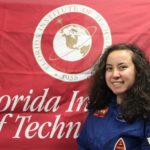 Cynthia Montanez — GreenHab Officer
Cynthia Montanez — GreenHab Officer
For as long as she can remember, Cynthia has always been passionate about plants. From a young age, she had spent her first 5 years in upstate New York enjoying the activity of apple picking. She would go every autumn season to pick the ripest apples and the freshest pears. Moving at the age of 6 to Orlando, Florida, she quickly became accustomed to the southern life and its forestry’s. From going orange picking, to playing in state parks, Cynthia has always loved being amongst the land surrounded by flowers and crops.
With her passion in botany, she started her Astrobiology journey by having her first job as a groundskeeper within her community. While assisting her neighbors with their lawn needs, she also educated them on basic plant science. As years passed, she also got a job in Lowes as the Outside Lawn and Garden Associate whom of which took care of the plants and educated the customers of basic horticulture.
Currently, she is enrolled at the Florida Institute of Technology, majoring in Astrobiology. She plans on using her knowledge and skills to grow plants on Mars. While being within the Astrobiological Research and Education Society (ARES), she was able to start using her skills by assisting in a vermicompost study within Mars regolith, and designed a regolith remediation project to transform the nonviable nature of said substrate into something viable. These two separate projects are to further express the notion that Mars itself is inhospitable unless conditioned with the right nutrients. Once able to provide evidence that such nutrients assist in the regolith’s viability, and that the experiment achieves the desired goal, Cynthia would like to see if she could one day work as a scientist within the botanical division of NASA’s Kennedy Space Center working to further perfect her experiment.
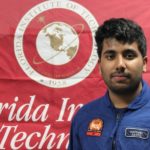 Robinson Raphael — Astronomer
Robinson Raphael — Astronomer
Robinson Raphael was born in Hewlett, New York. When he was younger his parents taught him basic skills that he eventually grew to do on his own. Such skills include cooking, cleaning, gardening etc. Being drawn to space at such a young age, Robinson would find ways to learn more about the cosmos. Whether it was looking at videos or looking at images, these small things fueled what he is passionately striving towards today. In high school, Robinson would try to take classes that revolved around his interest in majoring towards Astrophysics/Astronomy. From freshman to senior year, he has taken a multitude of science classes that range from astronomy to physics to chemistry. When it came time to graduate high school, he worked on a senior project with his astronomy professor. The project consisted of wavelength color application, with regards to X-ray imaging of various celestial bodies. Currently in college, Robinson is working under Dr. Caballero, who is the head director of the Olin Observatory here at Florida Institute of Technology. His initial research project involved mosaic imaging of a multitude of chosen celestial bodies that would be observed with the Ortega Telescope. As of now, his current project involves dust mitigation with regards to optical mirrors through the use of electrodes. With his time on campus, Robinson has gotten an understanding of the Ortega Telescope here on campus and its various key components. Not only that but also how to troubleshoot problems that may interfere with observations. Additionally in the research group he is apart of, him and his colleagues have also developed an updated manual of how to use the telescope as well as its various attachments. As time persisted, Robinson has also gotten the chance to learn a multitude of universal programs that are geared towards astronomical observations. Such programs include Simbad, Aladin, Isaac Newton Group of Telescopes and AstroImageJ. Even now with the upcoming semester, Robinson seeks out to find new opportunities to further his knowledge and experience in hopes of becoming an observational astronomer.
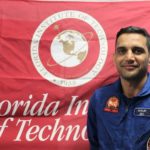 Abdul Elnajdi — Geologist
Abdul Elnajdi — Geologist
Born and raised in Libya. He graduated from Omar Al Mukhtar University and he worked as assistant research for 4 years. He had a passion for space and planets science since he was 5 years old. In 2009 He was the first Libyan student to space camp in Alabama where he learned many things about space technology. After college he got first camera and telescope and used it to photographing the sky and observing the planets. In 2013 he founded the first Libyan scientific society for astronomy and space technology. He used his organization to hold seminars and scientific activities to simplify space science for public. In 2014 he became Libya’s delegate to The Arab Maghreb Union for Astronomy and Space Technology.
In 2016 he got a scholarship from his university in Libya to come to the united states to finish his master dgree. Abdul has accepted at the Florida Institute of Technology to study Biochemistry with minor in Geochemistry. During his time in Florida Tech, Abdul is involved with many students’ organizations such as Alpha Phi Omega, Florida Tech Video Production, Rockets Society. Abdul later be invited to join the Astrobiological Research and Education Society to help participate in Martian Regolith where his thesis was about Mars simulant “MGS-1 Mars Global Simulant”. The thesis title was: Impacts of Sieving and Cultivation on Martian Regolith Simulant; The effect of different size particle fractions of JSC-MARS1A on chemical and mineralogical data was examined in this study. Also, because of his studies on Martian Regolith, He was able to study other types of regolith: KMS-1, MMS to increase his knowledge about the simulate.
Abdul graduated from Florida Tech 2018 and now he is a Ph.D. candidate at Ball State University pursuing a Ph.D. of Environmental Science degree in Geochemistry. In the near future, Abdul hopes to finish his PhD with the hopes of working in research at UAE space agency, and develop the knowledge about space science in his country, Libya.
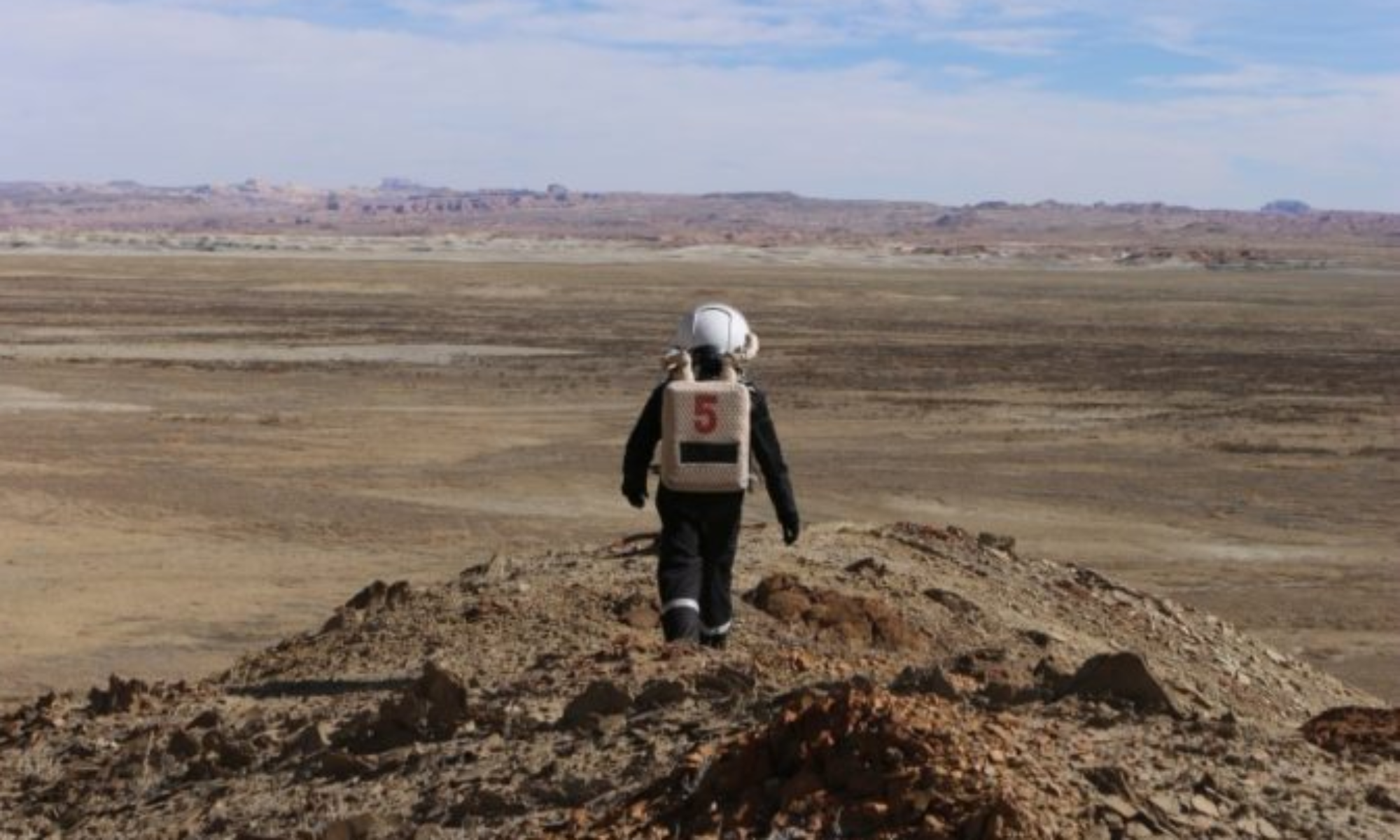
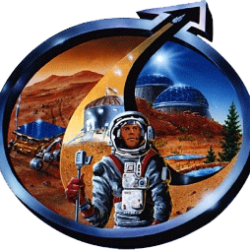
You must be logged in to post a comment.